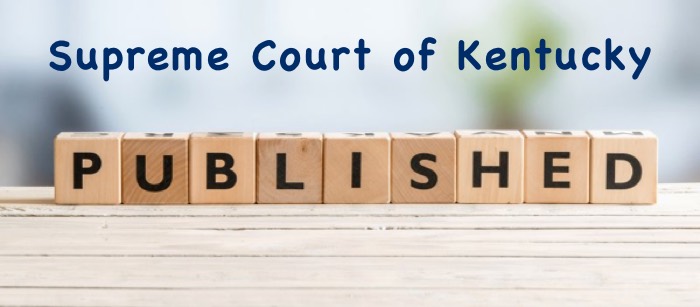
Tort, Insurance and Civil Procedure Cases this month:
Governmental Immunity
Board of Trustees of the Kentucky School Boards Insurance Trust v. Joseph N. Pope, Jr., Etc., et al. 2015-SC-000664-TG September 28, 2017
Opinion of the Court by Justice Venters. All sitting; all concur. Civil Appeal, Governmental immunity. Appellee, deputy insurance rehabilitator sued the Appellants for negligent management and breach of fiduciary duties with respect to a self-insured insurance trust fund. Appellants claimed immunity from suit as a governmental entity. Question presented: Whether the trial court erred by concluding that the Kentucky School Boards Insurance Trust (KSBIT) Board of Trustees does not qualify for governmental immunity. Held: Comair, Inc. v. Lexington-Fayette Urban County Airport Corp., 295 S.W.3d 91 (Ky. 2009), provides a two-prong test to determine whether an offspring entity is entitled to governmental immunity. The Board does not meet either test. As its parent entity is not the public school boards participating in KSBIT’s insurance programs, it was not created by a governmental entity the enjoys the cloak of governmental immunity. As its function is providing insurance coverage, the same business activity ordinarily accomplished by private individuals or business corporations, it is not performing a function integral to state government.
Nuisance
Brown-Forman Corporation, et al. v. George Miller
2014-SC-000717-DG September 28, 2017
Opinion of the Court by Justice Wright. All sitting; all concur. George Miller filed suit in Jefferson County against Brown-Forman and Heaven Hill seeking damages based on several state tort theories and seeking injunctive relief. Brown-Forman and Heaven Hill filed a motion to dismiss for failure to state a claim upon which relief could be granted. The trial court granted the motion to dismiss, as it determined the federal Clean Air Act preempted Miller’s claims. Miller appealed and the Court of Appeals reversed and remanded, holding that the Act did not preempt Miller’s claims. The Supreme Court granted Brown-Forman and Heaven Hill’s motion for discretionary review. The Court affirmed the Court of Appeals insofar as it held that the trial court erred in granting Brown-Forman’s motion to dismiss the state tort claims for damages, as these claims are not preempted by the Clean Air Act. However, the Court reversed the Court of Appeals’ holding regarding Miller’s injunctive relief. While the Court disagreed with the trial court that the Act preempted the injunctive relief, it held that the injunctive relief was inappropriate for other reasons. Namely, the Court held that the requested injunction, which would require implementation of a particular type of pollution-control technology not required under Brown-Forman’s and Heaven Hill’s permits, conflicts with the Clean Air Act by invading EPA and Metro District’s regulatory turf, in a manner that the Kentucky General Assembly has spoken against. Therefore, the Court held that an 6
injunction to control an alleged nuisance when the state has already specifically balanced those factors is inappropriate
